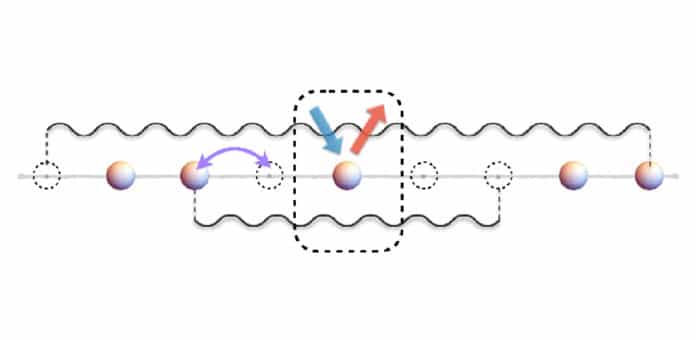Quantum systems that have the potential to revolutionize the way that complex calculation are performed uses a quantum bit, or qubit. A computer built with entangled qubits instead of normal bits could perform calculations well beyond even the most powerful supercomputers’ capacities.
However, qubits are incredibly finicky things, and the tiniest bit of noise in their environment can cause their entanglement to break.
Now, scientists from the University of Cambridge have found a way to protect highly fragile quantum systems from noise. According to scientists, qubits can remain intrinsically linked, or entangled, over long distances even if there are random disruptions between them.
Scientists used the mathematics of quantum theory to discover a simple setup where entangled particles can be prepared and stabilized even in the presence of noise by taking advantage of a previously unknown symmetry in quantum systems.
Dr. Shovan Dutta from Cambridge’s Cavendish Laboratory and Professor Nigel Cooper has recently developed a robust quantum system in which several qubit pairs remain entangled even with a lot of noise.
They displayed an atomic system in a lattice formation, where atoms unequivocally interact with one another, bouncing starting from one side of the lattice to another. Scientists found if the noise was added to the middle of the lattice, it didn’t affect entangled particles among the left and right sides. This surprising feature results from a special type of symmetry that preserves the quantity of such entangled sets.
Dutta said, “We weren’t expecting this stabilized type of entanglement at all. We stumbled upon this hidden symmetry, which is very rare in these noisy systems.”
The hidden symmetry saves the entangled pairs and allows their number to be controlled from zero to a large maximum value. Similar conclusions can be applied to a broad class of physical systems. They can be acknowledged with previously existing fixings in experimental platforms, making ready to controllable entanglement in a noisy environment.
Dutta said, “Uncontrolled environmental disturbances are bad for the survival of quantum effects like entanglement, but one can learn a lot by deliberately engineering specific types of disturbances and seeing how the particles respond. We’ve shown that a simple form of disturbance can produce – and preserve – many entangled pairs, which is a great incentive for experimental developments in this field.”
Scientists are now hoping to affirm their theoretical findings with experiments within the next year.
Journal Reference:
- Shovan Dutta and Nigel R. Cooper. ‘Long-range coherence and multiple steady states in a lossy qubit array.’ Physical Review Letters, (2020).
